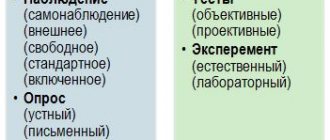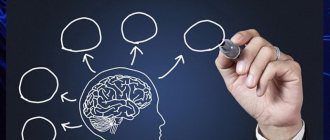Psychological research: requirements for the organization and its stages
Classification of research methods
Characteristics of the main empirical methods of psychology
Mastery of methods for studying personality psychology is one of the necessary components of a lawyer’s professional activity. A lawyer must be able to identify, analyze and take into account the individual psychological characteristics of a person (witness, suspect, accused), the goals of their actions and actions, hidden motives of behavior. The choice of methods for studying the personality of subjects of various legal relations in the professional activity of a lawyer, as well as the adequacy of the methods themselves, largely depends on the goals that he faces and on the nature of the issues that require resolution.
Empirical and theoretical thinking
In the history of psychological knowledge, conceptual thinking has been divided into two categories .
Theoretical and empirical thinking are distinguished as two concepts opposed to each other.
The first type of thinking is aimed at identifying, recording and describing the results of sensory experience and is called empirical.
Another type of thinking works with the essence of subjects, hidden and inaccessible to the senses and the laws of development. This type is called theoretical.
Both empirical and theoretical thinking are based on a special type of abstraction and generalization . For the empirical level, this is a comparison of individual qualities of objects and the search for differences between them based on the identified qualities.
Those. First, formally similar features are identified, which can be assigned the status of “general”. Then they are separated from others, fixed using a word-concept. The result is knowledge based on external (visual) evidence .
Branches of science
The development of the industry occurred in parallel in several forms, differing, but not contradicting each other. These areas include:
- Associative - a section that considers the psyche as a set of spiritual phenomena. A complex mental process consists of elements that can be separated: sensations and ideas and associations. Personality is a complex connecting the spiritual and the physical, based on individual associations.
- Voluntarism is a branch that considers will as the result of an energy impulse combined into complexes of emotional experiences.
- Functional - a section that studies thinking. Researchers analyzed the functions of consciousness and their participation in the act of thinking. Thinking was considered as an autonomous process, independent of the surrounding reality.
- Gestalt psychology is a branch based on the idea of the integrity of mental processes. It is complex and multifaceted, but it is impossible to remove a single element from it.
- Structural - a section that examines mental structures through idealistic ideas. Idealists who adhere to the structural composition of the psyche determined behavioral characteristics not by the influence of the external environment, but by internal processes.
In modern empirics, this direction occupies a special niche due to its dualistic nature.
The experimental approach to describing the nature of the psyche has accumulated a sufficient base of research results, but cannot provide a scientific explanation for them.
Their use in practice is not prohibited, but researchers may refuse to take into account the results of such experiments.
Definition of basic concepts
Empiricism , what is it? This is a direction in philosophy that denies any sources of knowledge other than sensory (direct) experience.
Empiricism in psychology suggests that people gain most of their knowledge through study and experience rather than through genetic predisposition.
Empiricists (empiricists) , who are they? These are supporters of the epistemological position, in which knowledge is considered reliable only when it is based on experience.
Empiricists are inclined to practical activity, believing that activity is a direct path to obtaining a result.
Empirically , through experience, experiment, or personal observation.
Empirical material , any material collected empirically or through personal observation/data collection.
Empirical thinking , thinking, the product of which is the primary generalization of experience gained through practice. This is a simple stage of cognition that does not delve into theoretical abstractions.
Empirical thinking is often confused with practical thinking, but they are actually two different categories.
Empirical generalization , the creation of certain conclusions or the identification of properties of objects according to a single common feature, expressed in verbal form. Creating classifications by properties allows you to work with a large volume of units (objects or facts).
Empirical observation , one of the methods of empirical research, expressed in the deliberate and directed perception of any subject (object) of knowledge in order to obtain information about its qualities, properties and relationships.
Empirical analysis , analysis of an object based on sensory perception and personal experience.
Empirical method , a method of research through observations and experiments with further identification of patterns.
Empirical evidence , information that confirms or refutes the belief in the veracity of any judgments. All evidence is based primarily on feelings.
Empirical testing , a method in which the subject of research is subjected to systematic observation in order to obtain reliable information.
Empirical data in psychology , data obtained through the senses, experimentally.
In psychology, this is material collected after direct observation or experimentation, without accompanying theoretical inference.
Structure of knowledge in brief
The structure of empirical knowledge contains 4 levels:
- First level . Single or protocol utterances, whether they contain a condition of existence or not. In such protocols, time and place must be recorded as observation conditions.
- Second level. The level is based on facts (general statements in static or universal form). They record information about the absence or presence of certain events, properties, relationships, etc. in the plane under study. Quantitative parameters of the recorded data are also subject to registration.
- Third level. The basis of the level is empirical laws, which are characterized by temporal and/or spatial constancy.
- Fourth (highest) level. Phenomenological theories or a set of interconnected laws and facts.
Thanks to the empirical school, psychology moved away from the speculative analysis of the psyche and took a step towards experimental methods of studying it. This has given rise to many discoveries in the field of psychological life.
Empirical methods of cognition :
Real or fictional
Conducting empirical research is a labor-intensive process. It is necessary to select psychodiagnostic methods, find subjects (form a sample), conduct testing of the subjects and process the data using keys in order to enter the results into the source data table. Not all psychology students have enough time and energy for this. In such a situation, it is tempting to make up results. Let's consider the pros and cons of this solution.
In a real empirical study, we test subjects, process the test results by keys and enter them into a summary table of test results (source data table). Then we process this table with statistical programs and obtain the results of a correlation analysis or the result of an analysis of differences. Based on the results of statistical calculations, we draw conclusions about the relationship between indicators, or about differences in indicators in groups of subjects.
Really conducting research is a fascinating process. Always curious what the result will be. However, there are situations when a psychology student, for some reason, cannot conduct real empirical research. In this case, the results of the empirical study will have to be invented.
The invented research assumes the reverse sequence of actions. We first come up with conclusions, and then, based on them, we form a table of testing results (a summary table of results), which, when statistically processed, gives the results and conclusions we need (formulated in advance).
Formally, from the point of view of the final result, works based on real data and invented ones are practically the same - in both applications there is a table of initial data, according to which all statistical criteria are calculated. The only thing that will not happen if the study is invented is the protocols filled out by the subjects during testing.
A fictional study is not always simpler than a real one. There are topics with obvious results. For example, the topic “Study of the relationship between leadership style and personal characteristics of middle-level managers in the trading sector” makes it easy to come up with a result. Indeed, it will be intuitively clear what personality traits will correlate, for example, with an authoritarian leadership style - self-confidence, rigidity, aggressiveness, etc. And sociability, diplomacy, etc. will correlate with collegiality.
At the same time, there are topics with non-obvious results. For example, “Study of the psychological characteristics of IT employees with different professional experience.” It’s difficult to come up with an expected and intuitive result out of your head. Most likely, there are no similar studies already conducted by anyone. So in this case, a real study would be more convenient.
I always suggest that clients who order me work on psychology conduct real research. In this case, I prepare tests and process them according to keys, and the client conducts the actual testing (sends out tests by mail or distributes them personally to subjects, then enters the result into an Excel spreadsheet and sends it to me).
Honestly, the actual research is more interesting. When processing data, some kind of childish curiosity always awakens - what will happen there. In the PhD dissertations that I write, the research is always real.
Observation method
One of the empirical methods is the observation method. This method requires careful preparation and professionalism of the researcher, because observation is conducted of a person’s mental manifestations.
This ancient method of cognition in psychology appears in two forms - firstly, as introspection or introspection, and secondly, as external or objective observation.
The observation procedure, in general, consists of certain processes:
- setting goals and objectives for observation;
- choice of object, subject and situation;
- choosing a method for observation that ensures the collection of the necessary information;
- choosing a method for recording observed phenomena;
- processing of received information and its interpretation.
Observation becomes a method of scientific knowledge insofar as it is not limited only to recording facts, but formulates hypotheses in order to test them against new observations.
Types of observation can be different - short-term observation (slice), long-term observation, which can last several years (longitudinal observation).
It can be laboratory, taking place in artificial conditions, or natural, taking place in conditions familiar to humans.
There are included and non-included observations. With participant observation, both the observer and the observed are included in the activity, but the observed do not know anything about the observation being made.
Non-participant observation presupposes the distribution of roles - some become observed and know about it, others become observers.
The observation method can be structured, when the structure of the observed facts is strictly subdivided, and unstructured - in this case, observation occurs over the entire set of facts.
Continuous and selective observation. All behavioral reactions are recorded during continuous observation, while during selective observation the area of observation is limited.
Observation can also be direct and indirect. Direct observation is carried out by the person himself, who draws conclusions based on its results.
Vicarious observation is carried out by another person.
Any method has its advantages and disadvantages. The observation method is not without its drawbacks, which are as follows:
- the results of observation are quite strongly influenced by the attitudes, interests, personal characteristics, and psychological state of the observer;
- the observer's focus on confirming his hypothesis leads to large distortions in the perception of events;
- difficulty in interpreting the data obtained;
- observation requires a lot of time.
As for introspection (introspection), this is the first method of psychology that allows us to study the soul and psyche of a person.
Introspection is an individual’s internal observation of his own mental manifestations. In psychology, professional introspection is not only useful, but even necessary, and in order for a person to be able to reflect himself, this must be learned.










